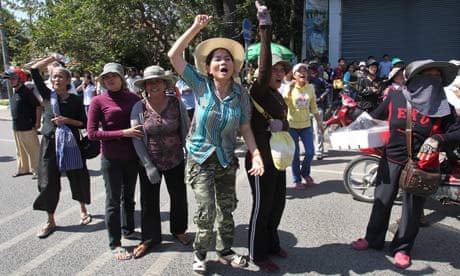Cambodian authorities have arrested at least six protesters in an on-going dispute over forced evictions in Phnom Penh, that saw two of the female demonstrators tear off their shirts in a rare act of defiance in this modest society.
The protesters were calling for promised housing and compensation, as well as the release of eight detainees who were arrested after a violent forced eviction on 3 January, when some 300 families were forced from their settlement at Borei Keila neighbourhood.
The protest on Wednesday turned violent after the district governor, Sok Sambath, ordered security forces to arrest the 50-odd female protesters assembled outside City Hall using "five [security guards or police] to each woman", the Phnom Penh Post reported.
Guards then restrained the women, some of whom were frail and elderly, and dragged them to a municipal police truck, according to the newspaper.
"In spite of a crackdown from the police, we will keep protesting until we receive a proper resolution from the municipal authority," said evictee Chum Ghan.
More than 400,000 Cambodians have been affected by land grabs and evictions since 2003, according to the Cambodian League for the Promotion and Defence of Human Rights (Licadho), which works in 12 provinces across half the country. Last year saw an unprecedented increase in land disputes, the group said, with an additional 11,000 families affected.
Land ownership was abolished under the Communist reign of the Khmer Rouge (1974-79), leaving millions of Cambodians without title deeds – and therefore vulnerable to domestic and foreign land grabs, as well as agriculture, mining and real estate projects.
In 2003, roughly 1,770 families living in the downtown slum of Borei Keila came to a land-sharing agreement with construction firm Phan Imex, which would see the firm construct 10 buildings on-site to house the families. In return, residents would allow the corporation to commercially develop the remaining 2.6 hectares of land.
But Phan Imex constructed only eight of the 10 buildings and in January moved in with over 100 armed state forces, guards and workers to disperse the remaining 300 families, who say they received no warnings and were unable to remove their belongings before the demolition began. Live ammunition and tear gas were fired at the residents and at least 12 were injured, according to Licadho.
January's eviction at Borei Keila follows the high-profile case of last year's forced removal of 10,000 residents of Boeung Kak lake, who were moved to build luxury flats and high-end shops for the developing firm, Shukaku, owned by a senator from the ruling Cambodian People's party. In a rare move, the World Bank froze its loans to Cambodia in response.
Wednesday's violence is yet another example of a continuing crackdown on protesters over land grabs, Licadho says, and presents a worrying trend.
"These recent incidents are symptoms of an accelerating breakdown in Cambodian society," said Licadho president Pung Chhiv Kek in a statement. "At the moment, it is largely the rural poor who are feeling the brunt. But land grabbing can only be pushed so far before it consumes the society as a whole.
"This is bad not only for ordinary Cambodians, but also for investors and others who are ostensibly benefiting from land redistribution."
